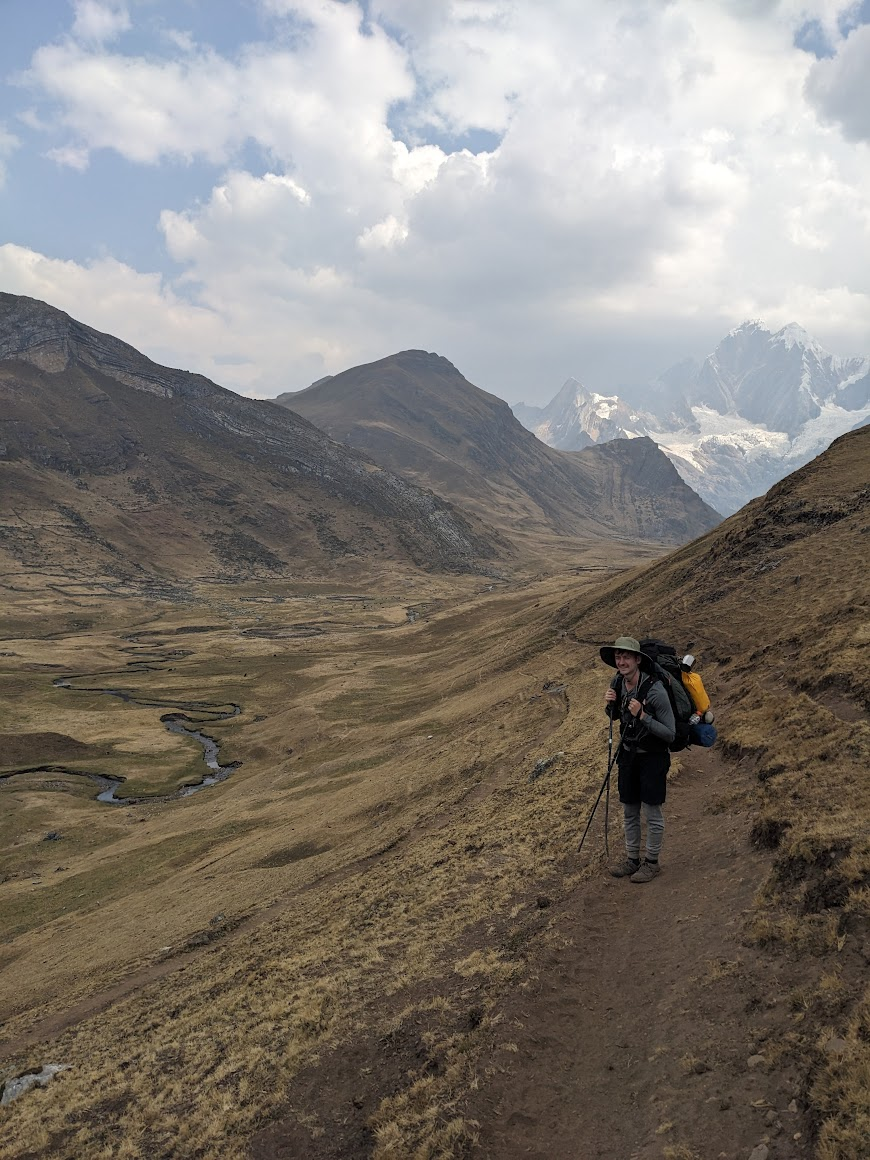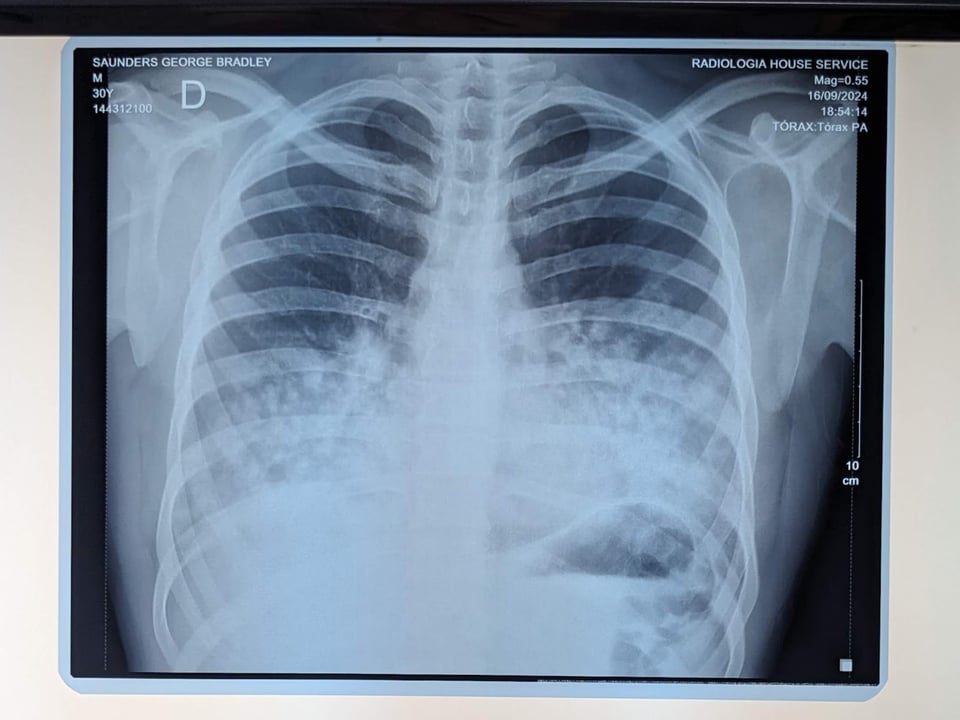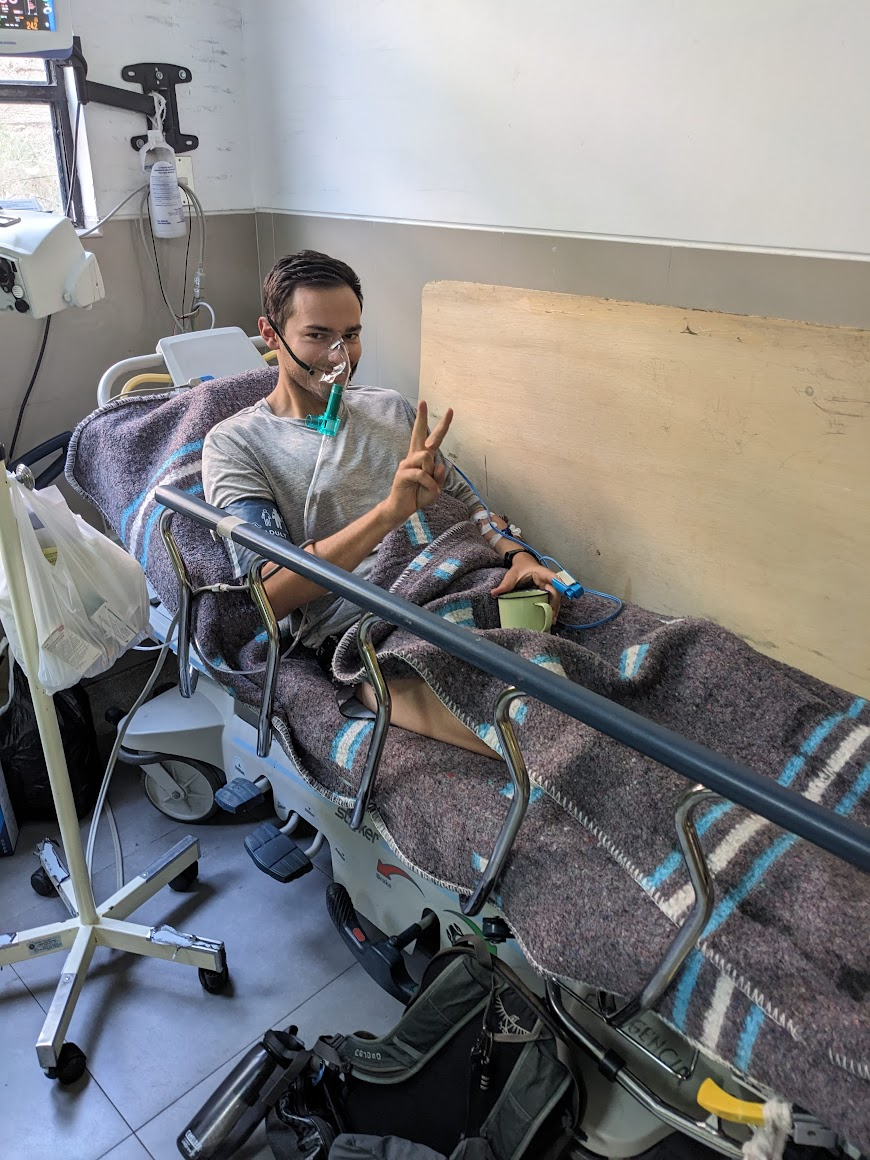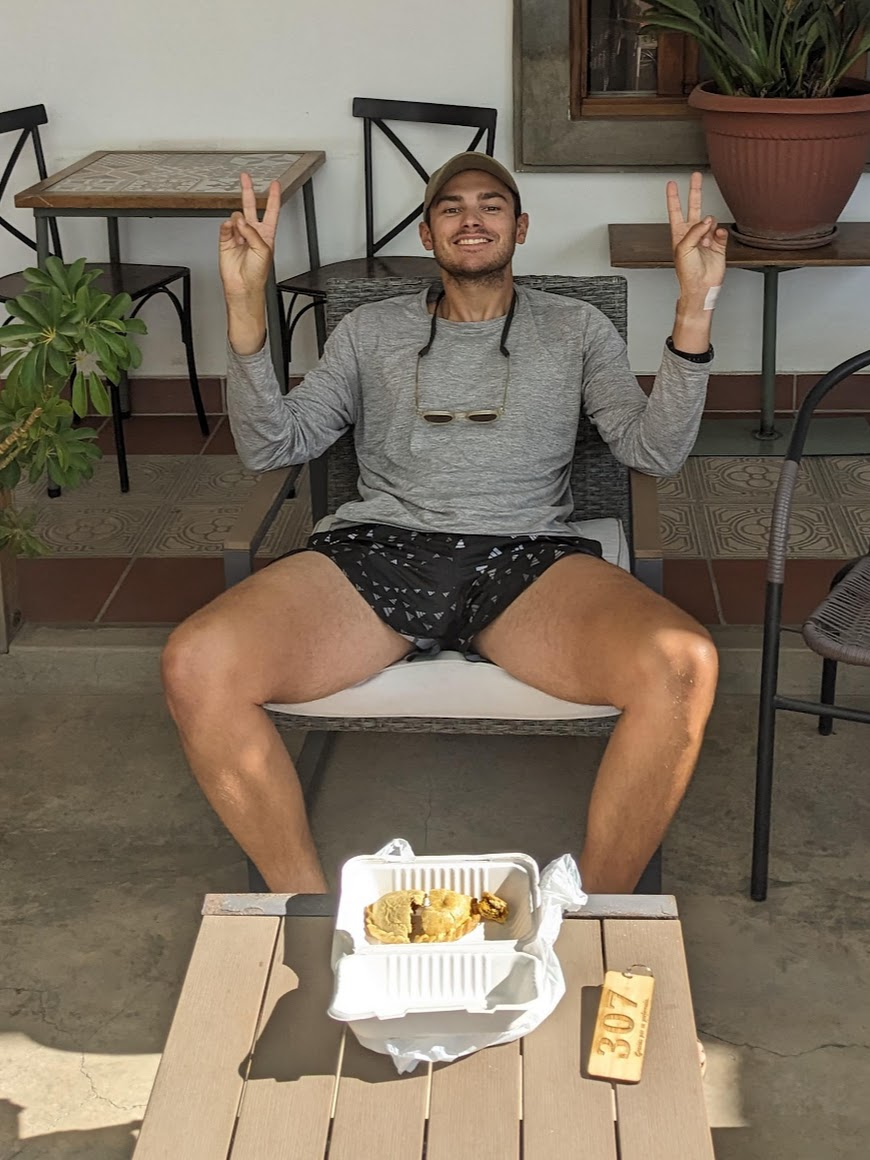[022] The Huayhuash Nearly Killed Me
I'm travelling in South America. Here's what I'm up to, some photos and other bits
This isn’t a story of bravery or heroism. There are enough of those out there. And people, friends, are going through much worse than this was for me. But I hope by telling it Miles Dilworth can understand why I was such an horrible snappy prick these last few days.
It’s Sunday 15th September and I’m sitting up in my bed in Huaraz. Have you seen the Danny Boy scene from the 1996 film Brassed Off? It’s basically that, except I’m coughing up yellow mucus not black coal (sorry for the image), the brass band playing outside doesn’t have shit on the Grimethorpe Colliery Band (no offence Peru, happy to be contested on this one), and oh there’s no plethora of friends here to see me it’s just me and lonely me (and Miles) (but I’m not dying, I must stress that).
We’d started the Huayhuash trek four days before, loading our already weighty backpacks with eight days of food and set off from the 4,200m start point. The path went straight up, Miles was blowing, and I was telling him things would get better. Then roles reversed. Halfway up the climb my legs started going and it was a relief to get to the pass. The rest of the afternoon was a difficult downhill stroll, and I was relieved to put my tent up.

I woke up on day two having been cold in the night and developing a cough. Breakfast helped, but I knew something was wrong the first few steps of the day. I had absolutely nothing in my legs, my head was throbbing, and breathing was getting harder. We decided to plod snail-like through the day, powered by coca leaves, but it was a slog and I wasn’t feeling any better. We finished the day with an incredible view over the lake and started chatting to a local farmer with whom we arranged to take me on horseback the next day to camp #3, to give me a rest.
But I had the worst nights sleep of my life. Any position other than sitting upright (cramming my head against my stupidly low tent ceiling) caused this gurgling sensation on my lungs and throat, and then a horrible bout of coughing. So I painfully persisted for 6 hours sampling different positions and paining myself in the process, before at 2am deciding to go to the outdoor loo simply for something to do. I plodded like a drunk, then realised that although sitting on the loo was cold, it was the most comfy position for sleeping with my head in my arms. So I did this for a bit and got 4 x 30 minute periods of not exactly ‘sleep’.
At 4am the guides started their work for the day (yes, not our guides, but another group’s guides - sometimes it does pay to spend a bit more and insist less on doing it self-sufficient), and as I chatted to them they explained I could take the horse down the valley to a town where a network of taxis and buses could take us back to Huaraz. So I pitched it to Miles, and he accommodatingly agreed to call off the walk and get me back for some rest.
The horse ride was easier than walking and quite cool, but it still felt awful. Miles walked ahead and the horse would plod along behind, then randomly canter to catch him up (I think he liked him). And so now to add to the list of things which hurt was my butt, core and back. After three hours we arrived into the village and I headed straight to the health centre. They were incredibly helpful (kudos Peruvian health network) and saw me straight away, but were shocked by some of the tests they did. My oxygen saturation level was 60% which is dangerously low (stop reading mum), and can result in confusion or disorientation, respiratory distress, loss of consciousness, cardiac arrest, organ failure.
So they hooked me up to an oxygen machine and spent 45 minutes trying to get me back up to 80%. An injection in my butt, some cough syrup, and I was sent away. The following day we spend 10 hours riding three different taxis back to Huaraz on horrible windy mountain roads, and the first taxi tried to get me and Miles sharing(!) the front passenger seat before some friendly Brazilian girls in the back volunteered to swap with us. I behaved like a toddler all day, sitting on the kerb panting every time we got out the car, and unable to carry my rucksack.
But here I am, back in Huaraz in my hotel bed (writing this badly - I’ll blame the cognitive impairment), and hoping I’m on the mend.
It’s hard to say what it was. Undoubtedly a mixture of altitude and cold, but I’d felt so good in the three months prior where I was consistently above 3,000m and going up to 6,000, before heading to Lima on the coast for two weeks. Maybe I didn’t give myself enough time to re-acclimatise, maybe I hadn’t recovered from the food poisoning I suffered in Lima, or maybe it was just bad luck.
But anyway, that was definitely the hardest few days I’ve had out here. Thank you to Miles for looking after me, and sorry for being such a pain. And for what it’s worth, the first two days of the Huayhuash trek are incredible (from those moments I could summon the strength to look up).

UPDATE: ONE WEEK LATER - 22.09.24
After writing the above I had a terrible night, waking breathless and anxious every hour, so I headed to the doctor’s the next morning. I felt as bad as ever, struggling to stand and my brain feeling like a shrivelled nut. We took a taxi to the doctors 50m down the road, me carrying a camping cup filled with disgusting phlegm, and tests showed that I was back down to 60% oxygen saturation.
They put me on oxygen and I headed to the hospital where I stayed for the next five days.
The first 24 hours were pretty chaotic and uncomfortable. We were thrown into the boiling pot of the critical care unit of a Peruvian hospital. My wheelchair was awkwardly parked in the middle of the ward whilst they arranged my bed and updates on my condition were passed between doctors. Beds seemed to be placed anywhere they could find space. People looked pretty sick. Loved ones were comforting each other crying, and families were pleading tearfully with doctors. My passport was asked for three times, and Miles was sent hither and thither to procure drugs for me. It was an assault on the senses.
Then I was taken for blood tests and X-rays. At some point a needle was put in my stomach, I pissed in a cup, and I had these weird wires plugged into bangles and sticky cups stuck on my torso. The diagnosis was pulmonary edema - basically liquid on the lungs. The treatment was oxygen, antibiotics and rest.


After two days I was moved off the critical care ward and into a six person room. I brought the average age down by about 30 years. Two abuelas in the corner, two mamas, and a lad in the corner handcuffed to his bed. The police officer came in every time he needed a piss. It felt more comfortable being here. Less lonely. A sense of solidarity, us lot taking our meals at the same time, all sat together, not saying a word to one another, but exchanging messages through our eyes as we whiled away the hours.
Every day it got more comfortable. Even though the short excursion to take a piss made me feel like I’d run a 5km (and not in a good way), I felt like I was getting stronger each day. I passed the hours with a bit of reading, some Spanish podcasts, lots of naps. Mainly instagram reels. But also time to reflect and appreciate. I feel that sometimes it can be a blessing to have an experience like this, to be reminded of our fragility and dependency.
I’ve achieved so much on this trip which has expanded my confidence. Crossing the Altiplano on bike, fighting the extreme cold, pushing an exhausted body to get over a last climb. All this is good to show that I can do things on my own. That I do have strength to handle physical and emotional challenges independently. But here I was completely helpless. Unable to do anything without the kindness and care of others around me. And showing that we can’t function in this world alone, but only by looking after those around us who need our support.
Also that we live in remarkable and resilient, but ultimately fragile bodies. That it takes only a piece of misfortune to end everything now, and that every one of us is destined to end our days in these hospitals, reliant on oxygen and modern medicine and doctors, which are only stemming the flow of time until our bodies give up.
So what to do with this knowledge? Well, I think one, look after ourselves. Diet, exercise, limiting stress. It is all important to staying healthy for as long as we can. At least the part we can control. And then there is the impetus to start enjoying everyday. Realise that these aren’t unlimited days, but special, unique, gifted days which we must try take as much joy out of, by being conscious and appreciating the magic of the world around.
And probably also to just give less of a shit. We stress so many things in life - Am I making the right career choices? What does this person think of me? Can I make it in this world? We are already a tiny insignificant living organism in this vast universe, and our significance is only going to lessen once we die. 100 years after that no-one is going to give a shit about us or remember us at all. And that’s fine. That’s actually good. It means we can start worrying less, and start enjoying more.
Anyway, I’ve digressed into (important) philosophical garble. The main message is: I’m OK, I’m on the mend. I’m feeling grateful. Peru is a magnificent country which I will tell you more about before I fly to Brazil in October.
Finally, a big shout out to Miles. Bless him, he came out here and spent the first week of his holiday tending to me in a hospital bed. But Miles, you’ve made my week so much less horrible through all the boring tasks you’ve done for me, and the hours you spent keeping me company at my hospital bed talking nonsense with me. Thank you, sincerely.
We’ll head to the jungle now and try get some good birdwatching in, and you can watch the monkeys. A lovely activity which shouldn’t screw up my lungs.
Love
George
